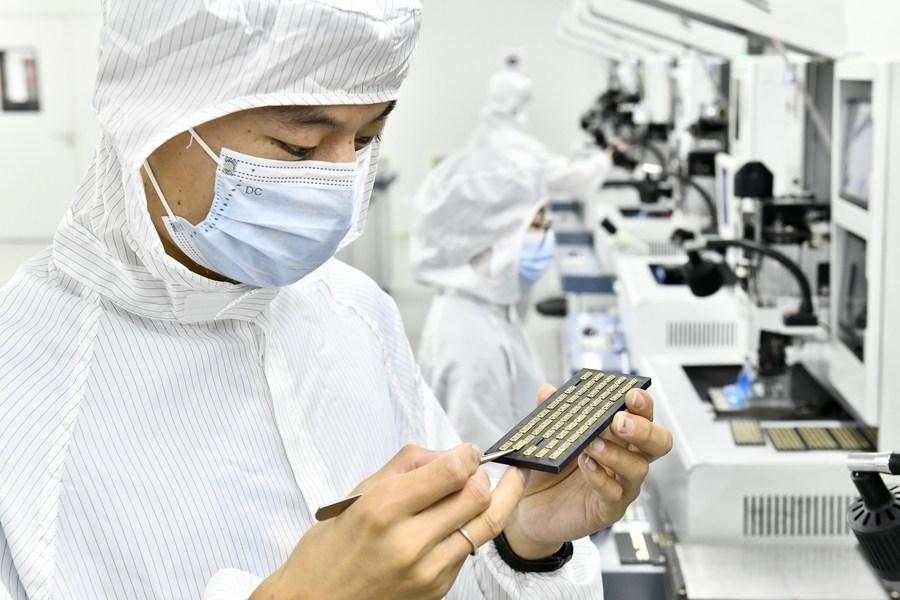Electronics, autos in forefront of new expansion plan
 0 Comment(s)
0 Comment(s) Print
Print E-mail China Daily, September 6, 2023
E-mail China Daily, September 6, 2023

A staff member makes surface acoustic wave filters at an industrial park in Rizhao Hi-Tech Industrial Development Zone of Rizhao City, east China's Shandong Province, June 29, 2023. [Photo/Xinhua]
China aims to vigorously develop its electronics manufacturing and automobiles sector, the country's top industry regulator said on Tuesday, as it races ahead to bolster its sprawling industrial economy and consumption amid challenges and external uncertainties.
The Ministry of Industry and Information Technology and the Ministry of Finance published a plan that aims to grow the industrial output of computers, communication equipment, and other electronics manufacturing industries at an average rate of 5 percent in 2023 and 2024.
The combined annual operating revenue of enterprises engaged in the electronic information manufacturing industry — which includes photovoltaic panels and lithium batteries — could exceed 24 trillion yuan ($3.29 trillion) in 2024, according to the plan. The number for 2022 was 20.3 trillion yuan.
Greater efforts will be made to cultivate new growth points, such as advanced computing and virtual reality, said Yang Xudong, deputy head of the electronic information department at the Ministry of Industry and Information Technology.
There will also be more measures to promote international cooperation in production capacity and applications in the photovoltaic, lithium battery and other fields, Yang said.
The plan also aims to increase the proportion of 5G mobile phone shipments to more than 85 percent in 2024. In the first six months of this year, 5G phones accounted for about 79 percent of all smartphones in China, according to the China Academy of Information and Communications Technology.
On Friday, MIIT and six other ministry-level departments also unveiled a plan to promote the consumption of cars. As per the plan, the automobile industry aims to achieve annual car sales of around 27 million units in 2023, a year-on-year increase of about 3 percent, with new energy vehicle sales of about 9 million units, marking a year-on-year increase of about 30 percent.
These moves are part of China's broader efforts to stabilize economic growth and sharpen its manufacturing edge. Local governments are also scrambling to hone innovation prowess and cultivate globally competitive industries.
Anhui province, for instance, is working hard to nurture industrial clusters focusing on new energy vehicles, advanced photovoltaic and new energy storage, and new generation information technology such as semiconductors and display, said Feng Kejin, head of the Department of Economy and Information Technology in the province.
"Since the beginning of this year, the automobile industry in Anhui has risen despite headwinds. From January to July, the province produced 1.23 million cars, ranking third in China. Among them, more than 420,000 units are NEVs, ranking fourth in the country," Feng said.
The revenue of the integrated circuit industry in Anhui has jumped to 49.7 billion yuan in 2022 from 14 billion yuan in 2018, with an average annual growth rate of over 30 percent, Feng added.
"Meanwhile, we are working hard to beef up our innovation prowess. The province has built two national manufacturing innovation centers, with one for smart voice technology and the other for glass materials," Feng said.
To increase the influence of Anhui in advanced manufacturing, it will partner with the MIIT and some others to hold the 2023 World Manufacturing Convention from Sept 20 to 24 in its capital, Hefei.
More than 300 foreign representatives, including executives from over 60 multinational corporations, will attend the convention, the conference's organizing committee said on Tuesday.





